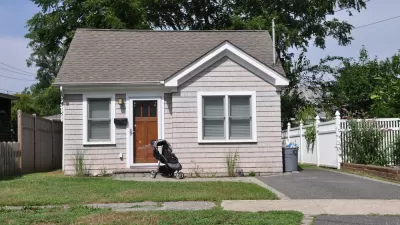The Federal Housing Administration has proposed a rule that could remove one of the barriers to mixed-use developments. Questions still remain about whether the new rule goes far enough.

Angie Schmitt reports on new lending standards for mixed-use condominium development proposed by the Federal Housing Administration.
Under current rules, FHA loans are available for mixed-use condo projects where the commercial component is 50 percent or less of the floor space. The agency may now lower that ratio to 20 percent or raise it to 60 percent, depending on what it thinks the market will support. FHA notes in its press release, however, that 'in the near term' it probably won’t allow a ratio higher than 50 percent, in order to protect the 'residential character' of condo projects.
Schmitt notes that experts, namely John Norquist, former president of the Congress for New Urbanism, have questioned the ability of the proposed rule change to really influence the development market to allow for mixed-use projects. According to Schmitt, Norquist "said 60 percent would be an improvement, but he thinks the feds should stop playing guessing games about what mix of commercial and residential will make projects viable." Norquist would prefer underwriting standards that focus on creditworthiness.
The proposed rule change would be one step toward "legalizing Main Street," as described in a recent op-ed by Jonathan Coppange.
FULL STORY: The Feds’ Tentative Steps to Legalize Mixed-Use Housing Don’t Go Far Enough

Maui's Vacation Rental Debate Turns Ugly
Verbal attacks, misinformation campaigns and fistfights plague a high-stakes debate to convert thousands of vacation rentals into long-term housing.

Planetizen Federal Action Tracker
A weekly monitor of how Trump’s orders and actions are impacting planners and planning in America.

Chicago’s Ghost Rails
Just beneath the surface of the modern city lie the remnants of its expansive early 20th-century streetcar system.

Bend, Oregon Zoning Reforms Prioritize Small-Scale Housing
The city altered its zoning code to allow multi-family housing and eliminated parking mandates citywide.

Amtrak Cutting Jobs, Funding to High-Speed Rail
The agency plans to cut 10 percent of its workforce and has confirmed it will not fund new high-speed rail projects.

LA Denies Basic Services to Unhoused Residents
The city has repeatedly failed to respond to requests for trash pickup at encampment sites, and eliminated a program that provided mobile showers and toilets.
Urban Design for Planners 1: Software Tools
This six-course series explores essential urban design concepts using open source software and equips planners with the tools they need to participate fully in the urban design process.
Planning for Universal Design
Learn the tools for implementing Universal Design in planning regulations.
planning NEXT
Appalachian Highlands Housing Partners
Mpact (founded as Rail~Volution)
City of Camden Redevelopment Agency
City of Astoria
City of Portland
City of Laramie





























